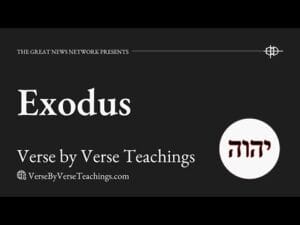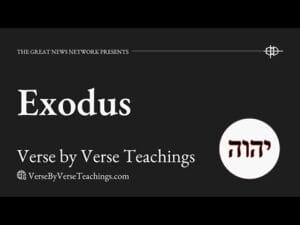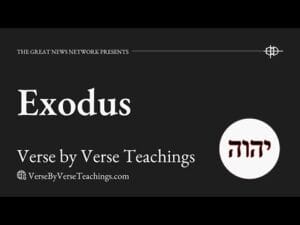
Exodus 7-12 Bible Teaching
Teaching on Exodus 7:14-25 at Salt Lake City Yeshuan Branch highlights plagues, symbolism of water/blood, frogs, parallels with Revelation, Passover, free will, and unity.

Teaching on Exodus 7:14-25 at Salt Lake City Yeshuan Branch highlights plagues, symbolism of water/blood, frogs, parallels with Revelation, Passover, free will, and unity.

Shawn McCraney's teachings focus on Exodus 5-7, highlighting divine power dynamics, spiritual conflict, and the importance of discernment, faith, and personal reconciliation with God.

The teaching highlights Israel's struggle with idolatry, Moses' encounter with YAHAVAH, the significance of God's name, signs given to Moses, and the importance of obedience.

Moses' early life, divine plans in adversity, faith-driven actions, Midian's transformative period, burning bush encounter, sacred name "I AM," and YAHAVAH's significance.

Exodus details Israel's escape from Egypt, God's covenant, and the Law. Shawn highlights themes of liberation, God's presence, and Christ typologies, emphasizing spiritual freedom.

Shawn's teaching on Job emphasizes human ignorance in suffering, God's unquestionable authority, and the futility of human pride in questioning divine wisdom.

Shawn's teaching on Job emphasizes empathy over judgment, understanding suffering's complexity, and recognizing God's wisdom beyond human comprehension, paralleling Elihu's role.

Suffering builds resilience; Job's faith prioritizes spiritual over material. Embrace trials, prioritize God, and align with His will for eternal life and peace.

The teachings view Satan as a metaphor for rebellion, not a being. They stress heartfelt commitment to God over strict law adherence, warning against idolizing religious practices.

Shawn's teaching reinterprets biblical texts, focusing on "fulfillment" and spiritual warfare, challenging the singular evil "Satan" concept, emphasizing choice, and exploring the evolution of Satan's portrayal in religious and cultural contexts.

Shawn's teaching explores "sons of elohiym" as angels in a divine council, distinct from humans, emphasizing God's singular plural nature, challenging LDS views, and focusing on biblical narratives like Job.

Shawn's teaching on Job highlights faith over doctrine, Job's trials, and the evolution of "satan" from an adversary to a personified enemy of God, emphasizing faith's role in righteousness.

Shawn's teaching on Job explores suffering and faith, emphasizing honest dialogue with God. It highlights Job's authenticity, contrasting with his friends' platitudes.

Shawn's teaching prepares for a spiritual event on Oct 1, 2023, focusing on biblical worship, forgiveness, unity, and contrasts ancient embalming with modern Christian views.

Shawn teaches that the tribes of Israel were never lost, fulfilled prophecy in Jerusalem, and emphasizes generational sin's impact, individual choice, and faith's transformative power.

Shawn's teaching covers Joseph's role in Israelite bondage, faith vs. sin, Jacob's burial wish, blessings on Ephraim and Manasseh, "God Almighty" title, and Jacob's prophecies.

Shawn's teaching highlights God's guidance despite human choices, the complexity of Old Testament narratives, the balance of masculine and feminine traits in faith, and Joseph's strategic economic actions in Egypt.

Joseph's journey from slavery to Egyptian ruler highlights forgiveness, providence, and reconciliation. He reveals his identity to his brothers, attributing his rise to God's guidance.

Joseph's brothers fear reprisal for money in sacks; Joseph shows favor to Benjamin. Shawn teaches faith, love, and truth over ancestry. Judah's selfless love mirrors Christ.

Shawn's teaching highlights God's adaptability and love, Joseph's journey from betrayal to power, themes of guilt, redemption, and familial responsibility, and the authenticity of biblical narratives.